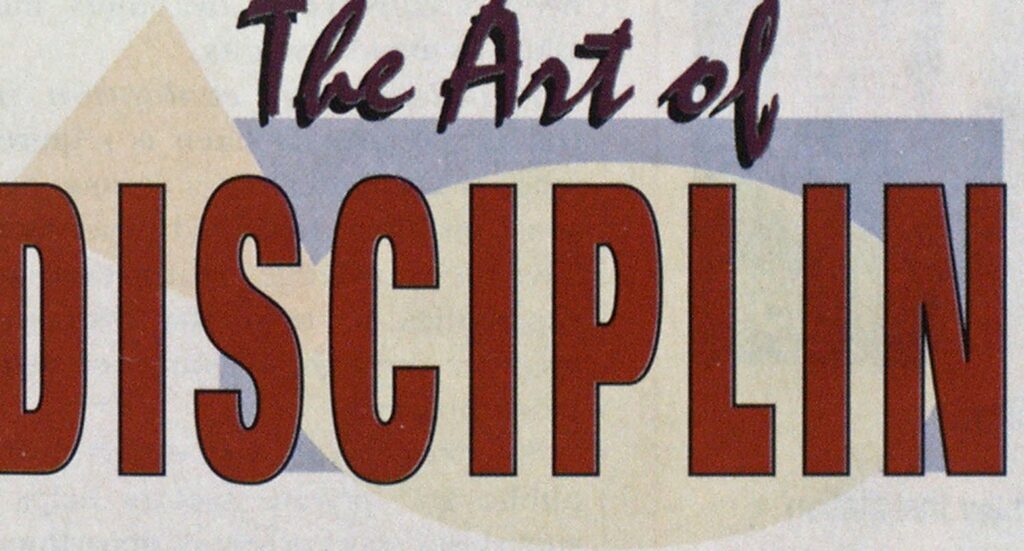
The Art Of DISCIPLINE

Discipline is the thread that runs through all fire service functions. Without it, a department could not function.
Discipline in radio communications is one of the keys to handling an emergency incident swiftly and competently. If the incident commander did not assign responsibilities, transmit vital information, and use clear text, the emergency scene would be chaotic. The results most likely would be opposing streams, freelancing, and physical injuries. Thus it is easy to see the need for discipline on the fireground and for the IC to quickly establish command and take control of responding units.
Similarly, having trained personnel and structured departmental procedures is necessary in the fire station if apparatus, equipment, and firefighters are going to be ready when they receive the alarm.
One way to keep discipline and control part of your organization is to reduce personnel apathy. Involve department members in the decisionmaking process. Have frequent formal and informal meetings to improve the flow of communication. At such meetings members can present new ideas, express individual opinions, and participate in healthy group discussions. Chiefs, company officers, seasoned veterans, and new recruits all should be involved —because regular, constructive feedback is the backbone of individual growth, organizational development, and ultimately better service to the community.
Another proven method for instilling discipline is to properly prepare personnel in management positions. Have a carefully planned and closely monitored officer orientation program. Focus on the technical and human skills needed to maintain command and control of a fire company. The emphasis on this “roll-up-yoursleeves” type of seminar is to improve the supervisor’s ability to be a problem solver. By making fire officers aware of common personnel problems through such instructional techniques as role playing and reviewing case studies, they will be able to spot inappropriate actions and deficiencies in their own management style. A facilitator must guide the program so that it does not get off track. The program must cover contemporary human resources problems that apply to the emergency responder—substance abuse, health and safety issues, legal liability, and, of course, discipline.
Maintaining discipline in the fireservice can be an exceedingly difficult and delicate task. It is only natural to develop close emotional bonds by living, training, and responding as a unit. However, supervisors must handle employee discipline in the same manner as corporate managers. According to Eugene C. Dressier, retired vice president of personnel for a major commercial bank, in his article “Counseling the Problem Employee, “Most supervisors find disciplinary actions to be the most disliked” of all their duties.
Thus it is imperative that all departments have a structured disciplinary system and provide formal instructions to members who are given supervisory responsibilities. Often when procedures and training are lacking, the officer tries to relate the current problem to a past situation. A supervisor w ill try to recall how it was handled by a past role model or conventional management practice. While this may be effective at times, it mostly likely will perpetuate a stagnant and tradition-bound organization. Very often it unfairly protects the troubled employee and puts enormous stress on the other employees.
In my career I have made many difficult decisions. Many had a widerange of options; most had no simplesolution. There was the Vietnam veteran who Was a good worker but had a bad drug habit…a politically connected firefighter who had a history of reporting to work under the influence of alcohoL.a minority member who refused to comply with the department’s rules for being out sick. These working relationships were like a double-edged sword—at times challenging and in the end unpleasant.
D.I.S.I.P.L.I.N.E
Every situation presents a unique set of circumstances; yet, there are common threads—in fact, enough similarities to combine the lessons learned with a practical memory device. Fortunately, there is sufficient information to provide a general guide for any supervisor who has an administrative problem and must take action that may result in discipline.
D—Due process cannot be accomplished without documentation and witnesses. You must record dates and specific details of poor performance or inappropriate behavior when the event occurs.
I—Improvement of an individual’s performance is the duty of a supervisor. It is important for an officer to clearly identify work standards, set deadlines, chart progress, and hold personnel accountable.
S—Sharing of experiences is a common way to improve yourself in the fire service, but it is inappropriate to reveal all the facts about an employee’s problem. Strict confidentiality is essential to maintain trust and stop potential discrimination or harassment.
C—Conflicts will appear when a supervisor does not consistently follow the directives of a department. Company officers must be role models where their words and deeds match.
I —Investigation at the initial signs of a drug or alcohol problem is a must.
P—Participative management is the present trend. Progressive departments provide periodic performance appraisals and encourage “face-saving” private conversations rather than public confrontations.
L—Listening and leadership are needed skills. Learn by others’ mistakes to avoid lawsuits.
1—Independent evaluation by trained counselors often is required when a firefighter has a serious personal problem. Informed supervisors have the knowledge, information, and capabilities to refer the distressed member through an employee assistance program.
N—Networking with others in the public and private sectors helps a supervisor stay current in department procedures, arbitrators’ rulings, and court decisions.
E —Enforcement of rules is the key to a stable work environment. Every time policies and procedures are ignored it creates uncertainty and erodes the effectiveness of the supervisor.
Just as an emergency needs an incident command system to track resources so that they can be used efficiently to support strategy and tactics, administrative problems need a judicial system—with terms like counseling, warnings, reprimand, and termination —to ensure impartial treatment and consistent policies as well as an efficient operation.
Now is the time for you to create your own personal system for supervising. Only by having a positive attitude and a commitment to your fellow firefighters can you increase the odds of successfully dealing with discipline.

